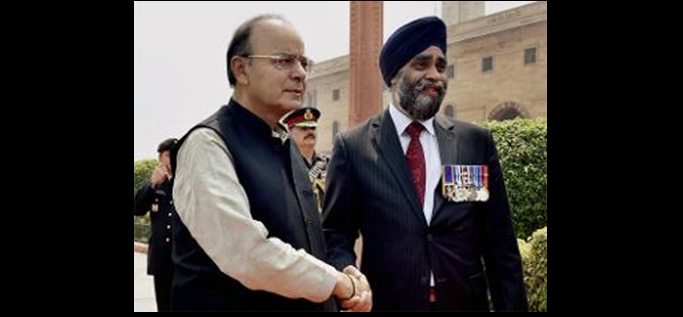BJP, Congress Come Together on 1984: Punjab CM 'Heckles' Canadian Defence Minister, Jaitley Takes Him to Task

NEW DELHI: The visit of Canadian Defence Minister to India Harjit Singh Sajjan is steeped in controversy as both the BJP and the Congress joined issue with the Ontario Parliament’s resolution describing the 1984 violence against Sikhs as “genocide.”
Prime Minister Narendra Modi did not meet the Minister. Finance Minister currently in charge of Defence, Arun Jaitley met him to convey India’s displeasure about the resolution questioning India’s human rights record and reportedly said, according to source based information, that “the language used in the resolution showed a highly unreal and exaggerated analysis of the situation” in India.
Punjab Chief Minister Amarinder Singh, however, went several steps further to maintain that he would not host the visiting dignitary as he was “pro-Khalistan.” Calling him a “Khalistan sympathiser” Singh actually jumpd the gun last week, even before the Minister had landed in Delhi, to insist that he would not meet him.
Sajjan, however, remained civil and after landing in India told reporters that he would still try and meet the Chief Minister saying that he was certainly not here to break the country. “I have been taught to show courtesy to the leadership of a country and I do this around the world. It is my responsibility to offer up a meeting (to the Captain) and if he decides he doesn’t want to meet me ... that’s for them to figure out. My actions and services speak for me... there is no ill will from me,” Sajjan told reporters here.
In an earlier interview to the Indian media Sajjan was clear, however, “the events of 1984 were clearly horrific and deeply regrettable. The importance of seeking justice for the victims should not be diminished. The promotion and protection of human rights around the world remains an integral part of Canada's foreign policy and our government attaches great importance to freedom from all forms of discrimination and religious intolerance. We respect cultural, ethnic, and religious differences.”
This has agitated the Congress under whose watch the massacre of Sikhs took place in New Delhi, with violence reported from other states in 1984 in the wake of Indira Gandhi’s assassination. The BJP is worried about the term “genocide” being used by the Canadian ruling party that controls Ontario, as this could lead to the possibility of opening other such incidents that have taken place in India internationally. The government had responded to this resolution immediately, and the issue was raised by Jaitley in some detail during his official bilateral.
However, the leader of the Opposition in the Punjab Assembly H.S.Phoolka Mr. H. S. Phoolka, has criticised as “unfortunate” Jaitley’s stand. And said that the Ontario Assembly “has rightly declared this killing as Genocide.”
He further added, “It is shocking and surprising that why Akali-Dal, a alliance partner in the Central Government and the Union Minister Harsimrat Kaur Badal are silent. It appears that for them their personal interest is more important than the ‘Cause’.” He said that the Akali Dal was now clearly supporting the Congress party and Amarinder Singh on this issue.
In Phoolka’s view, “Captain Amarinder Singh’s barb against the Canadian Defence Minister was aimed at stalling the Canadian Parliament from declaring Nov’84 killing as ‘Genocide’.” And that “Captain Amarinder Singh wants to save his friends Kamal Nath, Jagdish Tytler and Sajjan Kumar from going to jail. He is already espousing their case and gave them a clean chit.” He said that the Akali Dal was also now shielding these leaders.
Phoolka, a lawyer, has been relentlessly pursuing the case for justice for the victims of 1984 since then. He is representing the survivors in several cases in the court.
India-Canada-Relations-Hit-Ontario-Assembly-Terms-1984-Anti-Sikh-Violence-as-Genocide



